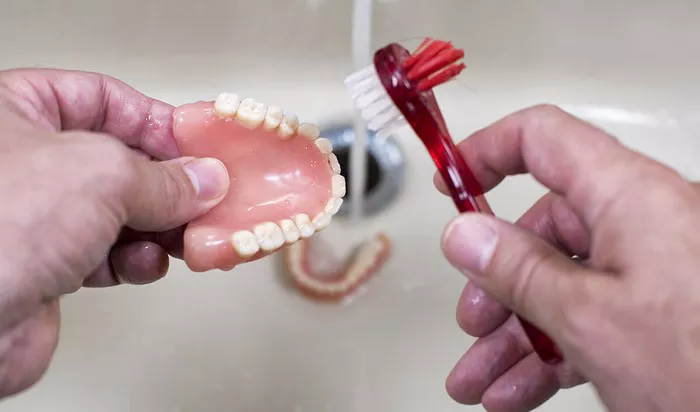Mold on dentures can be a distressing problem for denture wearers. Not only does it cause unpleasant odors and discoloration, but it also poses potential health risks. Proper cleaning and maintenance are essential to keep dentures mold-free, safe, and comfortable to wear. This article provides a detailed, step-by-step guide on how to clean mold off dentures effectively using safe and proven methods.
Understanding Mold on Dentures
What Causes Mold on Dentures?
Mold grows in warm, moist environments with poor ventilation. Dentures, when left uncleaned or stored improperly, create the perfect breeding ground for mold and fungi. Residual food particles, saliva, and plaque buildup contribute to this issue. Denture wearers who do not clean or soak their dentures regularly are at higher risk of mold development.
Health Risks Associated with Moldy Dentures
Mold can cause irritation, allergic reactions, and infections in the mouth. It may lead to oral thrush, a fungal infection caused by Candida species. For immunocompromised individuals, mold exposure can increase the risk of more serious infections. Therefore, maintaining clean dentures free of mold is critical for oral and overall health.
Signs That Your Dentures Have Mold
- Visible discoloration such as green, black, or white patches
- Unpleasant, musty odors
- Increased irritation or soreness in the mouth
- Persistent bad taste despite regular cleaning
Essential Tools and Materials for Cleaning Mold Off Dentures
- Soft-bristle denture brush or a soft toothbrush
- Denture cleaner tablets or mild, non-abrasive cleanser
- White vinegar or hydrogen peroxide (diluted)
- Baking soda
- Clean container for soaking dentures
- Warm water (not hot)
- Gloves (optional for sensitive skin)
Step-by-Step Guide on How to Clean Mold Off Dentures
Step 1: Rinse Dentures Thoroughly
Begin by rinsing the dentures under warm running water to remove loose debris and saliva. This helps to wash away some of the surface mold before deeper cleaning.
Step 2: Soak Dentures in a Vinegar Solution
Prepare a solution of one part white vinegar to three parts warm water. Soak your dentures for 30 minutes. Vinegar is a natural mold killer and helps to loosen mold deposits on the surface.
Step 3: Brush Dentures Carefully
After soaking, use a soft denture brush to gently scrub the dentures, paying close attention to grooves and crevices. Avoid using regular toothpaste, which is abrasive and can damage the denture surface.
Step 4: Use Baking Soda Paste for Stubborn Mold
If mold persists, make a paste of baking soda and water. Apply it to the dentures and brush gently. Baking soda acts as a mild abrasive and deodorizer, effectively removing mold and odors.
Step 5: Rinse and Soak in Hydrogen Peroxide
Rinse the dentures thoroughly and then soak them in a diluted hydrogen peroxide solution (equal parts hydrogen peroxide and water) for 10-15 minutes. Hydrogen peroxide kills mold spores and whitens the dentures.
Step 6: Final Rinse and Drying
Rinse dentures thoroughly with clean water after the hydrogen peroxide soak. Dry them with a soft cloth or let air dry before storing. Ensure the dentures are completely dry to prevent mold regrowth.
Additional Tips to Prevent Mold Growth on Dentures
Maintain Daily Cleaning Routine
Brush your dentures twice daily using a denture-specific cleaner and soak them overnight in a recommended solution to prevent mold formation.
Proper Storage
Store dentures in a clean, dry container with ventilation. Avoid keeping them in airtight containers that trap moisture.
Avoid Hot Water
Hot water can warp dentures, creating rough surfaces where mold can easily cling. Use warm or cool water for cleaning and soaking.
Regular Dental Check-Ups
Visit your dentist regularly for professional cleaning and to check the fit and condition of your dentures, which can influence mold growth.
Replace Dentures When Necessary
Over time, dentures wear out and develop microscopic cracks that harbor mold. Replace old dentures as recommended by your dental professional.
What Not to Use When Cleaning Mold Off Dentures
- Abrasive cleaners or regular toothpaste that can scratch dentures
- Bleach in high concentrations, which can damage dentures and irritate the mouth
- Boiling water that can distort the shape of dentures
- Harsh chemicals not intended for dental use
FAQs about Mold on Dentures
Can I use bleach to clean mold off dentures?
Bleach is not recommended due to its harshness and potential to damage dentures and irritate the mouth. Safer alternatives like vinegar and hydrogen peroxide should be used.
How often should I clean my dentures to prevent mold?
Clean dentures daily by brushing and soaking overnight in a denture cleaning solution to prevent mold buildup.
Is mold on dentures dangerous?
Yes, mold can cause infections and irritation in the mouth, so it’s important to clean dentures thoroughly and promptly if mold appears.
Can soaking dentures in vinegar damage them?
When diluted properly, vinegar is safe for dentures and effective against mold. However, prolonged soaking in undiluted vinegar can cause damage.
What if my dentures have stubborn mold stains?
Use a baking soda paste and hydrogen peroxide soak to remove stubborn mold stains, and consult your dentist for professional cleaning if necessary.
Conclusion
Cleaning mold off dentures requires regular, careful attention using safe methods such as vinegar soaking, gentle brushing, and occasional hydrogen peroxide treatment. Preventive care is key to keeping dentures mold-free and ensuring oral health. Always follow a consistent cleaning routine and seek professional advice when needed to maintain the longevity and hygiene of your dentures.
Related topics

